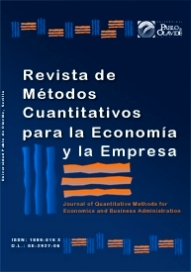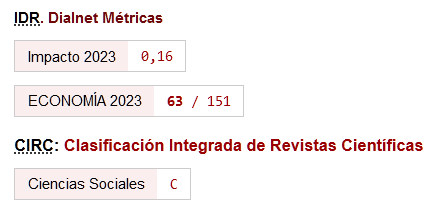Entrepreneurship in Peru before and during Covid-19: Determinants, income gap and technical efficiency
DOI:
https://doi.org/10.46661/rev.metodoscuant.econ.empresa.8084Keywords:
entrepreneurship, income gap, technical efficiency, gender, Blinder-OaxacaAbstract
It is implausible that the spread of Covid-19 has not had an impact on entrepreneurship in Peru, considering that on average 41.1% of the Economically Active Population is engaged in starting their own businesses. The objectives of this research are as follows: To estimate the influencing factors for individuals to become entrepreneurs through probabilistic regression models. To quantify the gender income gap in entrepreneurship using the Blinder-Oaxaca decomposition. Finally, to calculate the technical efficiency in the production of entrepreneurial activities using stochastic frontier models. The National Household Survey conducted annually by the National Institute of Statistics and Informatics in Peru was utilized, with a sample size of 21,243 entrepreneurs in 2019, 9,935 in 2020, and 18,042 in 2021. The highlighted results are as follows: Firstly, variables such as age and being the head of a household increase the likelihood of both men and women becoming entrepreneurs. On the other hand, the gender income gap was 78.0% in favor of men in 2019, 75.5% in 2020, and 76.4% in 2021. Lastly, in 2019 and 2020, the highest average technical efficiency, i.e., the percentage of total maximum achievable production, was observed in the commerce sector (79.5% and 7.94%, respectively), and in 2021, it was in the services sector (83.9%). Additionally, at the gender level, women exhibit higher efficiency in production and services activities
Downloads
References
Abdieva, R., Sulaimanova, B., & Karymshakov, K. (2019). Gender differences, risk attitude and entrepreneurship in Kyrgyzstan. Economics and Business Letters, 8(1), 17-30. https://doi.org/10.17811/ebl.8.1.2019.17-30
Azubayeva, B. (2021). The impact of cultural capital on development of entrepreneurship in Wales. Administrative Sciences, 11(4), 1-24. https://doi.org/10.3390/admsci11040152
Battese, G. E., & Coelli, T. J. (1988). Prediction of firm-level technical efficiencies with a generalized frontier production function and panel data. Journal of Econometrics, 38(3), 387-399. https://doi.org/https://doi.org/10.1016/0304-4076(88)90053-X
Becker, G. S. (1994). Human Capital: A Theoretical and Empirical Analysis with Special Reference to Education (3era ed.). The University of Chicago Press.
https://doi.org/10.7208/chicago/9780226041223.001.0001
Belotti, F., Daidone, S., Ilardi, G., & Atella, V. (2013). Stochastic frontier analysis using Stata. Stata Journal, 13(4), 719-758. https://doi.org/10.1177/1536867x1301300404
Blinder, A. S. (1973). Wage Discrimination: Reduced Form and Structural Estimates. The Journal of Human Resources, 8(4), 436-455. https://doi.org/10.2307/144855
Castro-Rojas, S., Corrales, J., Burbano-Vallejo, E. L., & Coral-Vallejo, A. A. (2022). Migration, return and entrepreneurship in Colombia. Revista Venezolana de Gerencia, 27(7), 31-46. https://doi.org/10.52080/rvgluz.27.7.3
Chen, J., & Hu, M. (2021). City-level hukou-based labor market discrimination and migrant entrepreneurship in China. Technological and Economic Development of Economy, 27(5), 1095-1118. https://doi.org/10.3846/tede.2021.15006
Greene, W. H. (2018). Econometric Analysis (8va ed.). Pearson.
Heckman, J. J. (1979). Sample Selection Bias as a Specification Error. Econometrica, 47(1), 153-161. https://doi.org/10.2307/1912352
INEI. (2022). Estadísticas con enfoque de género. https://m.inei.gob.pe/media/MenuRecursivo/boletines/01-informe-tecnico-enfoque-de-genero-oct-nov-dic-2021.pdf
Jaiswal, M. (2020). Gender differences and new venture performance. New England Journal of Entrepreneurship, 23(1), 41-61. https://doi.org/10.1108/NEJE-08-2019-0038
Jann, B. (2008). The Blinder-Oaxaca Decomposition for Linear Regression Models. The Stata Journal, 8(4), 453-479. https://doi.org/10.1177/1536867X0800800401
Laamanen, J. P. (2019). Externalities of home-ownership on entrepreneurship: empirical evidence. International Journal of Housing Markets and Analysis, 12(1), 94-109. https://doi.org/10.1108/IJHMA-01-2018-0008
Leon, J., & Leasaski, D. (2014). Determinantes del proceso de emprendimiento empresarial femenino en el Perú. Pensamiento Crítico, 13, 57. https://doi.org/10.15381/pc.v13i0.9000
León-Mendoza, J. (2018). Emprendimiento de negocios propios en el Perú: el rol de los factores sociodemográficos personales a nivel de departamentos. Estudios Gerenciales, 34(146), 19-33. https://doi.org/10.18046/j.estger.2018.146.2810
Luque-Vílchez, M., Rodríguez-Gutiérrez, P., & Guerrero-Baena, M. D. (2019). The gender of the CEO as a determinant of the survival of the company: The case of Spanish agri-food SMEs. Revista Galega de Economía, 28(1), 1-12. https://doi.org/10.15304/rge.28.1.6159
Matricano, D. (2022a). The influence of gender on technology transfer processes managed in Italian Young Innovative Companies: A stochastic frontier analysis. Technovation, 111, 102383. https://doi.org/10.1016/j.technovation.2021.102383
Matricano, D. (2022b). Young entrepreneurs and skills mismatch in school-to-work transition: empirical evidence from innovation processes managed in Italian NTBFs. 44(6). 1028-1045. International Journal of Manpower. https://doi.org/10.1108/IJM-09-2021-0547
Meeusen, W., & van Den Broeck, J. (1977). Efficiency Estimation from Cobb-Douglas Production Functions with Composed Error. International Economic Review, 18(2), 435-444. https://doi.org/10.2307/2525757
Mendoza-Aranzamendi, J. A., Pinto Villar, Y. M., & Galvez Marquina, M. C. (2021). Peruana del bicentenario: promotora del emprendimiento en tiempos de crisis. Comuni@cción: Revista de Investigación En Comunicación y Desarrollo, 12(4), 332-342. https://doi.org/10.33595/2226-1478.12.4.586
Mincer, J. (1974). Schooling, Experience, and Earnings (1era ed.). National Bureau of Economic Research.
Nyakudya, F. W., Simba, A., & Herrington, M. (2018). Entrepreneurship, gender gap and developing economies: the case of post-apartheid South Africa. Journal of Small Business and Entrepreneurship, 30(4), 293-324. https://doi.org/10.1080/08276331.2017.1412612
Oaxaca, R. (1973). Male-Female Wage Differentials in Urban Labor Markets. International Economic Review, 14(3), 693-709. https://doi.org/10.2307/2525981
Palacios-Duarte, P. D., Saavedra-García, M. L., & Cortés-Castillo, M. del R. (2020). Estudio comparativo de rendimientos empresariales de hombres y mujeres en México: una aproximación empírica. Revista Finanzas y Política Económica, 12(2), 431-459. https://doi.org/10.14718/revfinanzpolitecon.v12.n2.2020.3375
Qian, F., Hong, J., Yang, N., & Yuan, X. (2022). Entrepreneurship and innovation efficiency: the moderating role of absorptive capacity. Chinese Management Studies. 17(6). 1161-1175. https://doi.org/10.1108/CMS-12-2020-0530
Rico, P., & Cabrer-Borrás, B. (2018). Gender differences in self-employment in Spain. International Journal of Gender and Entrepreneurship, 10(1), 19-38. https://doi.org/10.1108/IJGE-09-2017-0059
Rubilar-Torrealba, R., Chahuán-Jiménez, K., de la Fuente-Mella, H., & Marzo-Navarro, M. (2022). Econometric Modeling to Measure the Social and Economic Factors in the Success of Entrepreneurship. Sustainability (Switzerland), 14(13), 7573. https://doi.org/10.3390/su14137573
Sánchez-Torné, I., Pérez-Suárez, M., García-Río, E., & Baena-Luna, P. (2021). ¿Cómo influye el género en la Intención Emprendedora? Un análisis del estudiantado universitario. Revista de Investigación Educativa, 39(2), 427-444. https://doi.org/10.6018/rie.428451
Soria-Barreto, K., Rueda Galvis, J. F., & Ruiz Escorcia, R. R. (2021). Factores determinantes del emprendimiento en Chile y Colombia. Revista Venezolana de Gerencia, 26(5 Edición Especial), 459-477. https://doi.org/10.52080/rvgluz.26.e5.30
Tello, M. D. (2022). Índice de eficiencia técnica de las empresas de Perú. Revista Desarrollo y Sociedad, 90, 111-151. https://doi.org/10.13043/DYS.90.4
Tiammee, S., Wongyai, J., Udomwong, P., Phaphuangwittayakul, A., Saenchan, L., & Chanaim, S. (2019). Smart farming in Thailand. 2019 13th International Conference on Software, Knowledge, Information Management and Applications, SKIMA 2019. https://doi.org/10.1109/SKIMA47702.2019.8982525
Torres M., M., Ramos R., J. L., Galvis M., M. M., Ramos C., J. L., & Biswell J., J. E. (2021). Determinantes del emprendimiento juvenil en Colombia: un análisis desde la nueva economía institucional. Revista de Métodos Cuantitativos Para La Economía y La Empresa, 32(32), 300-323. https://doi.org/10.46661/revmetodoscuanteconempresa.4264
Tubadji, A., Dietrich, H., Angelis, V., Haas, A., & Schels, B. (2021). Fear-of-failure and cultural persistence in youth entrepreneurship: Comparative analysis: Greece versus Germany. Journal of Small Business and Entrepreneurship, 33(5), 513-538. https://doi.org/10.1080/08276331.2019.1692999
Wang, H.-J. (2002). Heteroscedasticity and Non-Monotonic Efficiency Effects of a Stochastic Frontier Model. Journal of Productivity Analysis, 18(3), 241-253. https://doi.org/10.1023/A:1020638827640
Wang, J., & Zhou, D. (2022). How Internet Use Spurs Entrepreneurial Activities? Evidence from China. Mathematical Problems in Engineering, 2022, 1-10. https://doi.org/10.1155/2022/8363325
Watkins-Fassler, K., & Rodríguez-Ariza, L. (2019). International entrepreneurship and Mexican listed family firms' CEO/Board characteristics. Estudios Gerenciales, 35(153), 361-369. https://doi.org/10.18046/j.estger.2019.153.3166
Yalcintas, M., Iyigün, O., & Karabulut, G. (2021). Personal Characteristics and Intention for Entrepreneurship. Singapore Economic Review, 808. https://doi.org/10.1142/S0217590821500338
Zapata, G., Fernández López, S., & Neira Gómez, I. (2018). El emprendimiento tecnológico en Suramérica: una aproximación a sus determinantes individuales. Perfiles Latinoamericanos, 26(52), 1-20. https://doi.org/10.18504/pl2652-003-2018
Published
How to Cite
Issue
Section
License
Copyright (c) 2023 Luis Enrique Barriga Sairitupa, Juliana Mery Bautista López, José Ignacio Aguaded Gómez

This work is licensed under a Creative Commons Attribution-ShareAlike 4.0 International License.
Submission of manuscripts implies that the work described has not been published before (except in the form of an abstract or as part of thesis), that it is not under consideration for publication elsewhere and that, in case of acceptance, the authors agree to automatic transfer of the copyright to the Journal for its publication and dissemination. Authors retain the authors' right to use and share the article according to a personal or instutional use or scholarly sharing purposes; in addition, they retain patent, trademark and other intellectual property rights (including research data).
All the articles are published in the Journal under the Creative Commons license CC-BY-SA (Attribution-ShareAlike). It is allowed a commercial use of the work (always including the author attribution) and other derivative works, which must be released under the same license as the original work.
Up to Volume 21, this Journal has been licensing the articles under the Creative Commons license CC-BY-SA 3.0 ES. Starting from Volume 22, the Creative Commons license CC-BY-SA 4.0 is used.










